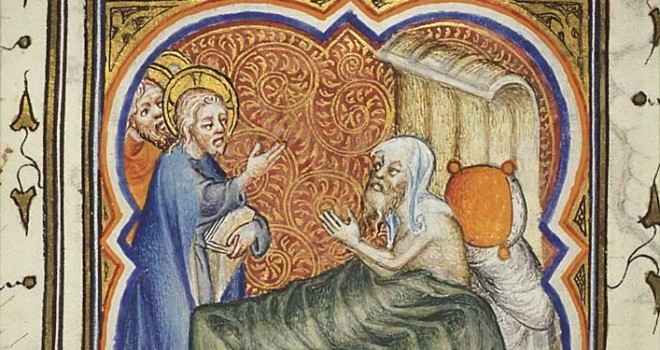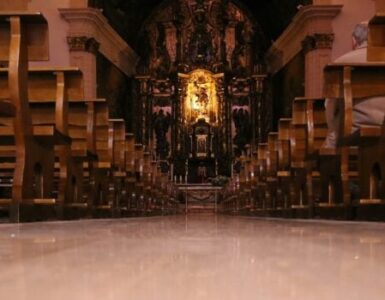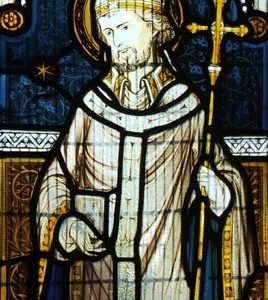In the Gospels, Jesus heals two blind men. He gives sight to the blind. Then, he drives the demon out of a demoniac. He gives voice to the mute. Then, he goes around to all the cities and villages curing every disease and healing every infirmity and preaching the gospel of the kingdom (Matt 9:27-35).
Don’t we wish he
would visit our town? Come to us in our homes? Heal our
sicknesses and those of our loved ones? Many of us are suffering and in need of
the healing presence of our Lord Jesus Christ, who is the Healer – the
Healer, I say, and not merely a healer.
God is the one who
heals. We have to understand this. All healing comes from God. And he wants
to heal us. This is clear if we read the gospel. Practically every page of the gospels,
especially Matthew, Mark, and Luke, Jesus is healing his people.
And
he carries right on with his healing here and now. Do not be deceived into
thinking his healing work is merely historical. Be attentive: he is in
our town, in our homes, and in our hearts. He is here right now, and he wants
to heal us. And, if we are healed, it is because he has healed us.
A
true and wise healer will always acknowledge this. One way to know whether a healer
is authentic – and this holds true whether we’re talking about a doctor or a
priest or a preacher – is to look at whether they use healing to glorify
themselves or to glorify God. Do they acknowledge that all healing comes from
God? Or do they just crave attention or fame or money? Does your doctor
acknowledge God? You might want to seek one out who does.
I’m
not saying that God can’t use a self-glorifying atheist to work his healing. He
can and he does. He can also use heretics and charlatans. God can do anything.
I’m only saying, it’s often better to work with those who have some idea of
what’s actually going on.
And
if your surgeons think they’re the ones healing you and that they aren’t
instruments in God’s hands every bit as much as those scalpels are instruments
in theirs, then they don’t understand what’s actually going on. For all their education,
if they fail to acknowledge God, they understand nothing.
Every
good thing comes from God. He is the giver of all talents and all knowledge.
If
Jesus appears to you and heals you, it is clear that Lord is healing you. Also,
if a holy man or woman prays over you and you are healed, it is the Lord who
heals you. If you come before the presbyters of the Church when you are sick
and they pray over you and anoint you with oil in the name of the Lord and you
are healed, it is the Lord who heals you (cf. James 5:14-15). But also, if a
showy faith healer in it for the money knocks you over and you are healed, it
is the Lord who heals you. If a pious Christian surgeon cuts out your tumor and
your cancer is cured, it is the Lord who heals you. If an atheist nutritionist
gives you good advice about how to eat right and heal your gut, it is the Lord
who heals you.
If
we are healed, it is because the Lord has healed us.
No
one understood this better than St. Panteleimon, whose feast we celebrated just
yesterday (July 27th). He was a highly learned physician – so talented
that he impressed the ruler Maximian, who gave instruction that Panteleimon was
to be prepared as the Royal Physician. (Of course, that was when Panteleimon
was still following the paganism of his father, who had paid for all his fancy education).
But
Panteleimon wanted to be a great physician, and his desire to bring
healing led him to the only true Healer, because healing only comes from God. He
came to understand this and so embraced the Christian faith of his mother.
Panteleimon
raised up a child bitten by a deadly viper, gave sight to the blind, healed the
paralyzed, healed wounds, and cured all who came to him. He was a trained
physician, but he insisted that it is Jesus Christ and not Panteleimon who is
our true healer.
In
fact, though he is counted among the unmercenary healers because he did not
charge his patients any money, he did ask for another form of payment: that
those who were healed acknowledge Jesus Christ as their true healer.
And
so they gladly did, even though doing so at that time and place often earned
them a martyr’s death. Think on that – to be healed only to be killed for it.
But this, in fact, was their true healing: to come to Christ, to live in
Christ, and to die in Christ is to rise in Christ and live forever in him. This
is our true and lasting and total healing of both body and spirit.
Saint
Panteleimon himself went on to die a martyr at the age of 30. He died even
younger than Jesus, who was crucified at the age of 33.
Take
note of this as well: they extended the lives of others, but died young themselves.
Long life is not the point. Eternal life is the point.
Another
fact to bear in mind: all the people that Saint Panteleimon healed, and all the
people that Jesus healed before his own death on the cross, have died since
then. Even the people that he raised from the dead have died again since then.
Despite having been raised from the dead, Lazarus now awaits the resurrection
with his sisters Martha and Mary (cf. John 11:23-44).
Some
die young and some die old; some die sick and some die healthy, but we all die.
So, what is the point of all this healing? Why heal us if we’re only going to
die?
Well,
did you hear what else Jesus was doing while he was going from town to town and
healing everybody? He was preaching the coming Kingdom (Matt 9:35)! The
healings we receive now are a foretaste of the lasting healing we receive in
the Kingdom. They are a sign, as the Gospel of John likes to call them.
Furthermore,
they are calling and an opportunity. We who have been healed will have to
answer for the fact. What do we do with the gift of life God has given us? Each
day we draw breath, it is by God’s mercy and grace.
For
one thing, he gives us life so we can be a witness to others of the healing and
saving power of Jesus Christ! We must testify to the world that he has healed
us and saved us.
For
another thing, it so that we have more time to repent and be forgiven. Are we
using our time for repentance? For worshipping God? Or for more
self-indulgence?
Healing
and the forgiveness of sins go hand in hand. We are bodies and souls at the
same time. Note that the Lord will often begin his healing by forgiving sins.
He says, “your sins are forgiven” even before he says, “stand up and walk” (cf.
Matt 9:2-6)
Note
also, that many times when our English translations of the scripture say “heal,”
the Greek word (ἰάομαι) connotes salvation (eg Matt 13:15). He saves us.
From what? From sin and death.
The
connection between healing and the forgiveness of sins is preserved in the holy
mystery of anointing as we celebrate it in our Byzantine Churches. Our prayers
are for healing and also for the forgiveness of sins.
If
we repent, we will be forgiven and healed. And if we are healed, it is a calling
to repent.
Both
as a sign of the coming kingdom and as an opportunity to repent, our healing by
the Lord points to the everlasting healing from death we receive in Jesus
Christ and in his kingdom.












